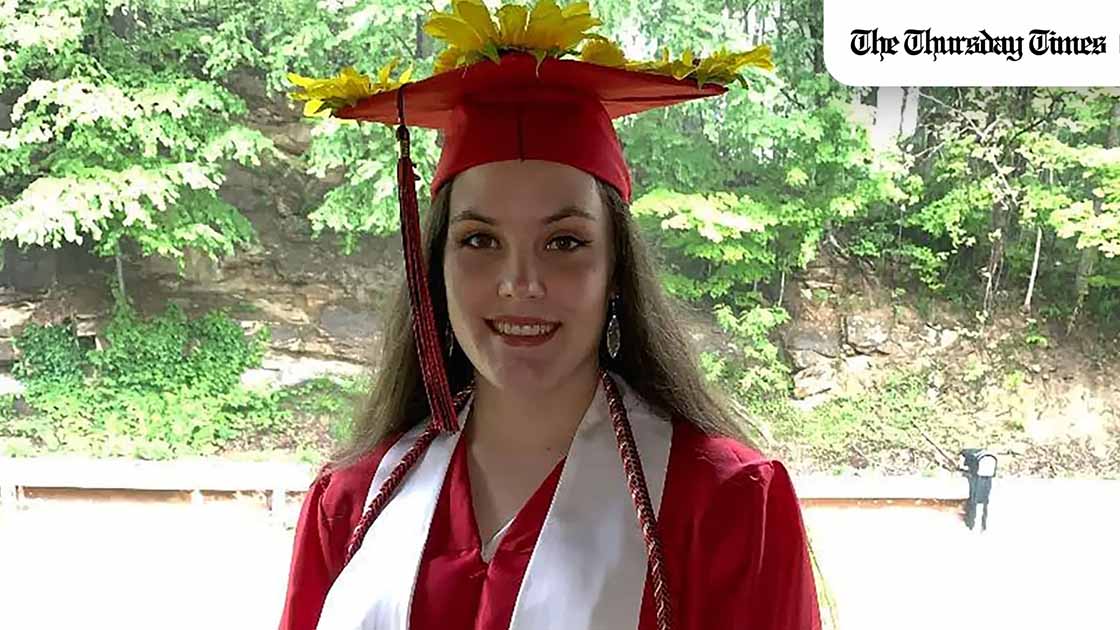WASHINGTON D.C. (THE THURSDAY TIMES) — President Donald Trump used a Thanksgiving address to confirm that Specialist Sarah Beckstrom, a 20-year-old member of the West Virginia National Guard, had died from gunshot wounds sustained in an ambush-style attack just blocks from the White House, praising her as a “highly respected, magnificent young person” who had volunteered so that others “could be home with their families.”
U.S President Donald Trump has just announced that Sarah Beckstrom, the West Virginia National Guard member shot near the White House, has died of her injuries. He called her a “highly respected, magnificent young person” and said: “She is no longer with us.” pic.twitter.com/7cTqmzN6fq
— The Thursday Times (@thursday_times) November 27, 2025
Beckstrom and Staff Sergeant Andrew Wolfe, 24, had been on duty near Farragut Square on Wednesday afternoon when, investigators say, a gunman approached at close range and opened fire, striking both Guard members in the head and, in Beckstrom’s case, the chest. The attacker first used a .357 revolver, then picked up Beckstrom’s service weapon and continued shooting before another Guardsman returned fire and wounded him, bringing the assault to an end on a busy Washington pavement.
Rushed into emergency surgery, Beckstrom did not survive. Her father told The New York Times that doctors had described her injuries as a “mortal wound” and warned the family that “it is not going to be a recovery,” a bleak assessment that foreshadowed the President’s sombre confirmation of her death. Wolfe remains in critical condition, with officials warning that his recovery, if it comes, is likely to be long and uncertain.
Authorities have identified the suspect as Rahmanullah Lakanwal, a 29-year-old Afghan national who entered the United States in 2021 under Operation Allies Welcome and later settled in Washington state, where he was granted asylum in April 2025. Since the shooting, United States officials have confirmed that in Afghanistan he served in a CIA-backed “Zero Unit”, an elite counterterrorism force that worked closely with American intelligence during the war.
The attack is being investigated as a potential act of terrorism. Lakanwal faces multiple counts of assault with intent to kill while armed, charges that federal prosecutors say will be upgraded to first-degree murder following Beckstrom’s death. Attorney General Pam Bondi has said the Justice Department is examining whether to add terrorism charges and seek the federal death penalty, signalling that the case is likely to become a major national-security test.
Beckstrom and Wolfe had reportedly been sworn in to their Washington deployment less than 24 hours before the shooting, part of a controversial surge of National Guard troops into the capital under Trump’s August “crime emergency” executive order. Officials had presented them as emblematic of a new generation of young soldiers asked to stand in for local police amid political battles over crime, public order and who should police the streets of the capital.
Her death has already intensified a fraught political debate over Afghan resettlement and security vetting. Supporters of Operation Allies Welcome point out that tens of thousands of Afghans who aided United States forces have resettled quietly and peacefully, arguing that a single alleged attacker should not erase wartime obligations and promises made during a 20-year conflict. Critics have seized on Lakanwal’s background, arguing that if a former member of a CIA-supported unit can end up accused of killing American soldiers within sight of the White House, the system for distinguishing allies from future threats is fundamentally flawed.
The revelation that the suspect once served in a clandestine, American-backed “Zero Unit” has raised uncomfortable questions in Washington about the long afterlife of the Afghan war. Those units operated in the shadows, carrying out raids against Taliban and Islamic State targets, and were later hurried through evacuation pipelines or left behind when Kabul fell, with little public debate about how their members would be supervised or supported in peacetime.
For Beckstrom’s family and colleagues, the arguments in the capital feel distant. In West Virginia, officials have described her as a dedicated young soldier at the very start of her career, someone who volunteered for a difficult, politically charged deployment and paid with her life less than a day after taking up her post. Friends and commanders have spoken of a quiet professionalism rather than politics, of a young woman who signed up to serve and became the face of a national argument she did not choose.
As prosecutors prepare their case and politicians trade accusations over immigration and security, the image that lingers is of a 20-year-old Guard specialist whose name was first known to the wider public not for her service record, but because a President announced on live television that she was gone.





